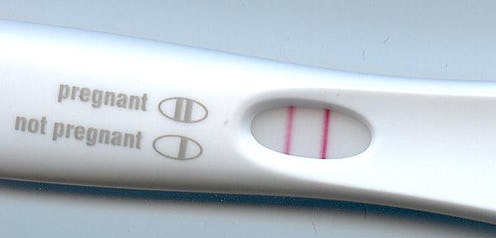News
California Cracks Down On Pro-Life Clinics

On Friday, California Gov. Jerry Brown officially signed into law a landmark piece of legislation that passed in the state assembly by a large margin back in May. It's known as the Reproductive FACT Act, which targets crisis pregnancy centers in California, and it includes two major requirements. The first is that each crisis pregnancy center facility clearly informs women if it is not in fact a licensed medical clinic. For the 40 percent of California crisis pregnancy centers that are licensed clinics, the other major requirement is that clinic staff make patients aware of the fact that the state offers financial assistance for abortion services, prenatal care, and contraception.
If you've never heard of a crisis pregnancy center, or CPC, you're not alone. Although CPCs aren't uncommon — there are at least 170 in just the state of California — they operate a bit under the radar. While they often appear to be regular old health clinics, critics claim CPCs are largely run by pro-life Christian groups, according to The New York Times. Staffers at some clinics allegedly encourage women to carry pregnancies to term, and a 2015 NARAL Pro-Choice America report claims such facilities falsely advertise abortion-related services to get women through the door. Once inside, the report also claims that women are often discouraged from learning their abortion options, and are not readily made aware that the center offers no abortion services to begin with. Bustle has reached out to several California crisis pregnancy centers for comment — including A Woman's Friend in Marysville, Care Net Pregnancy Center of Northern California, and Obria Medical Clinics based in Aliso Viejo — but has not yet received a response.
Those who run crisis pregnancy centers argue that they are simply providing women with abortion alternatives they might otherwise not be introduced to. "Women who come in are constantly telling us, ‘Abortion seems to be my only alternative and I think that's the best thing to do,'" Peggy Hartshorn, president of Heartbeat International told The New York Times. "Centers provide women with the whole choice." But that "whole choice" is precisely what's in debate.
According to a 2010 Ms. Magazine investigation of CPCs by journalist Kathryn Joyce, crisis pregnancy centers open strategically near abortion clinics, allegedly in hopes of luring women away. Joyce also reported that CPCs sometimes provided false information about a woman's due date, telling her that it's too late for an abortion. Clinic staffers also allegedly have frightened women out of choosing an abortion by promulgating abortion myths, such as telling women about "unproven links between abortion and cancer, infertility or suicide," Joyce wrote.
These alleged anti-abortion tactics could strike anyone as devious, especially since the clinics bill themselves as places women can go in times of crisis to explore their options. But any health clinic that discourages a woman from getting an abortion is doing more than just a disservice to her — it could be putting a woman's health at risk, too. As reported in Mother Jones, by the time a woman leaves the care of a CPC in California, she might have received inadequate prenatal care:
In a letter to the [California] legislature, Therese McCluskey, the perinatal services coordinator for the Alameda County Public Health Department, said that many patients who transfer from crisis pregnancy centers to the clinics she oversees come without prenatal records, lab reports, or the pregnancy verification form that entitles them to pregnancy-related healthcare. Patients typically transfer at the point when they are too far along in their pregnancy to obtain an abortion.
If true, this seems like a terrible bait-and-switch. (Stall them until it's too late!) But these alleged tactics can have serious consequences. Delayed prenatal care translates to health risks for the baby. During the senate hearing for the California bill, Sally Greenwald, an OB-GYN at the University of California-San Francisco, testified that she saw a patient with "alarming blood sugar levels" who had been receiving care from an unnamed CPC in California. "The fetus was exposed to lifelong risks, such as cardiac malformations, brain anomalies, and spine deformations," Greenwald claimed. "We could have lowered the sugar in her blood and we could have had better outcomes both for mom and for baby."
Amazingly, though, crisis pregnancy centers receive both state and federal funding, according to NARAL Pro-Choice America's report. Given that these centers receive public funds, it seems pretty absurd that they've previously been allowed to operate without any sort of official oversight or regulation — and still do outside California, according to the National Women's Law Center. Pro-life groups have even lobbied against previous attempts to regulate CPCs. Local efforts in New York, Austin, and Maryland's Baltimore and Montgomery County have met with differing levels of success, according to Mother Jones. As the NWLC also notes, one such attempt to regulate CPCs in New York City was struck down because the court found it was "not narrowly tailored to protect women's health" and that the city could find other ways of informing the public through PSAs.
All of those reasons and more make this California bill a real success story. It will serve as a template for regulatory bills elsewhere, according to Amy Everitt, director of NARAL Pro-Choice California, which backed the bill. The opposition isn't going down without a fight, though. On Saturday, just one day after Gov. Brown signed the bill, two crisis pregnancy centers sued the California attorney general, claiming that the bill violates their freedom of speech. It looks like a court battle looms ahead, but with the signing of this new bill, at least some progress has been made.
Image: TipsTimesAdmin/Flickr; Pexels